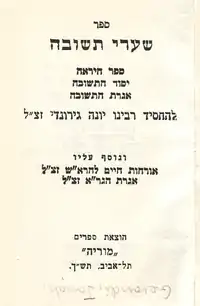| Repentance in Judaism Teshuva "Return" |
|---|
|
Repentance, atonement and higher ascent in Judaism |
|
|
| In the Hebrew Bible |
| Aspects |
| In the Jewish calendar |
| In contemporary Judaism |
Atonement in Judaism is the process of causing a transgression to be forgiven or pardoned.
In Rabbinic Judaism
In Rabbinic Judaism, atonement is achieved through repentance, which can be followed by some combination of the following:
- confession
- restitution
- the occurrence of Yom Kippur (the day itself, as distinct from the Temple service performed on it)
- tribulations (unpleasant life experiences)
- the experience of dying.
- the carrying out of a sentence of lashes or execution imposed by an ordained court (not now in existence)
- Temple service (not now in existence, e.g. bringing a sacrifice).
Which of these additions are required varies according to the severity of the sin, whether it was done willfully, in error, or under duress, whether it was against God alone or also against a fellow person, and whether the Temple service and ordained law courts are in existence or not. Repentance is needed in all cases of willful sin, and restitution is always required in the case of sin against a fellow person, unless the wronged party waives it.
According to Maimonides, the requirements for atonement of various sins between man and God are as follows:[1]
| Sinned under duress | Sinned in error | Sinned willfully | |
|---|---|---|---|
| Positive commandment | none | none | Repentance + confession or Yom Kippur Temple service |
| Negative commandment | none | none | Repentance + confession + Yom Kippur or Yom Kippur Temple service |
| Severe negative commandment | none | Sin offering (if Temple exists) in some cases + confession | Repentance + confession + Yom Kippur + tribulations or Repentance + confession + Yom Kippur Temple service |
| Profaning God's name | Repentance | Sin offering (if Temple exists) in some cases + confession | Repentance + confession + Yom Kippur + tribulations + dying |
The sentence of an ordained court (when available) can also substitute for Yom Kippur + tribulations + dying.
In Judaism, once a person has repented, they can be close to and beloved of God, even if their atonement is not yet complete.[2]
True repentance
The Mishnah states:
To a man who says, 'I will sin and repent, I will sin and repent', Yom Kippur brings no atonement. For sins against God, Yom Kippur brings atonement. For sins against one's fellow man, Yom Kippur brings no atonement until he has become reconciled with the fellow man he wronged.[3]
According to Maimonides, in order to achieve true repentance the sinner must abandon their sin, remove it from their thoughts, and resolve in their heart never to repeat it, as it is said, “Let the wicked forsake his way and the man of iniquity his thoughts" (Isaiah 55:7). Likewise, they must regret the past, as it is said, "Surely after I turned I repented" (Jeremiah 31:18). They must also call Him who knows all secrets to witness that they will never return to this sin again.[4]
Lashes (Makkot)
The third chapter of tractate Makkot enumerates 59 offenses, each entailing lashes. Anyone guilty of a sin which is punished by Kareth ("excision") may be atoned by receiving these lashes. The author of this teaching, Hanina bar Gamaliel, adds: "If by the commission of a single sin one forfeits his soul before God, then all the more so by a single meritorious deed (such as voluntary submission to punishment) his soul should be saved."[5]
Execution
The Pentateuch specifies capital punishment, as opposed to private retribution or vengeance, for the following crimes: adultery (Lev. 20:10; Deut. 22:22); bestiality (Ex. 22:18 [A. V. 19]; Lev. 20:15); blasphemy (Lev. 24:16); false evidence (intended to lead to a conviction) in capital cases (Deut. 19:16-19); false prophecy (Deut. 13:6, 18:20); idolatry or inciting others to the same (Lev. 20:2; Deut. 13:7-19, 17:2-7); incestuous or unnatural connections (Lev. 18:22, 20:11-14); insubordination to supreme authority (Deut. 17:12); kidnapping (Ex. 21:16; Deut. 24:7); licentiousness of a priest's daughter (Lev. 21:9); murder (Ex. 21:12; Lev. 24:17; Num. 35:16 et seq.); rape committed on a betrothed woman (Deut. 22:25-27) or fornication by or with her (Deut. 22:20, 23–24); striking or cursing a parent, or otherwise rebelling against parental authority (Ex. 21:15,17; Lev. 20:9; Deut. 21:18–21); Sabbath-breaking (Ex. 31:14, 35:2; Num. 15:32–36); witchcraft and augury (Ex. 22:17; Lev. 20:27).[6]
Role of animal sacrifice

When the Temple in Jerusalem was active, a Jew was required to bring animal sacrifices to atone for certain types of sins, and to perform a version of the viduy confession ritual as part of the sacrificial ritual. However, simply bringing an offering never automatically caused God to forgive the sin. The Hebrew Bible teaches:
- "In sacrifice and offering, you have not delighted, but you have given me an open ear. Burnt offering and sin offering you have not required." (Psalms 40:6)
- "For you will not delight in sacrifice, or I would give it; you will not be pleased with a burnt offering. The sacrifices of God are a broken spirit; a broken and contrite heart, O God, you will not despise." (Psalms 51:16–17)
- "For I [God] desire steadfast love, and not sacrifice; the knowledge of God, rather than burnt offerings." (Hosea 6:6)
- "Take with you words and return to the LORD; say to him, 'Take away all iniquity; accept what is good; instead of bulls we offer our lips.'" (Hosea 14:3)
Many places Rabbinic literature emphasizes that performing charitable deeds, praying, and studying Torah are more meritorious than animal sacrifice, and that the former can replace animal sacrifice when the Temple is not active:
- "Rabbi Yochanan ben Zakkai was walking with ... Rabbi Yehoshua, ... after the destruction of the Temple. Rabbi Yehoshua looked at the Temple ruins and said, ' ... The place that atoned for the sins of the people Israel lies in ruins!' Then Rabbi Yohannan ben Zakkai spoke to him these words of comfort: '... We can still gain ritual atonement through deeds of loving-kindness.'" (Midrash Avot D'Rabbi Nathan 4:5)
- "Rabbi Elazar said: Doing righteous deeds of charity is greater than offering all of the sacrifices, as it is written: 'Doing charity and justice is more desirable to the Lord than sacrifice' (Proverbs 21:3)." (Babylonian Talmud, Sukkah 49)
- "Rabbi Shmuel bar Nahmani said: The Holy One Said to David: 'Solomon, your Son is building the Temple. Is this not for the purpose of offering sacrifices there? The justice and righteousness of your actions are more precious to me than sacrifices.' And how do we know this? 'To do what is right and just is more desirable to Adonai than sacrifice.' (Proverbs 21:3)" (Talmud Yerushalmi, B'rakhot 2.1)
- "One who does teshuvah is considered as if he went to Jerusalem, rebuilt the Temple, erected the altar, and offered all the sacrifices ordained by the Torah. [For the Psalm says], 'The sacrifices of God are a broken spirit; a broken and contrite heart, O God, You will not despise [51:19]'" (Leviticus Rabbah 7:2 (Midrash))
- "Rava said: Whoever studies Torah does not need [to sacrifice offerings] (Menahot 110a) ... Said God: In this world, a sacrifice effected their atonement, but in the World to Come, I will forgive your sins without a sacrifice." (Midrash Tanhuma Shemini, paragraph 10)
- "Even if a man has sinned his whole life, and repents on the day of his death, all his sins are forgiven him" (Maimonides, Yad, Teshuvah 2:1)
In other Jewish denominations
Some Jewish denominations may differ with Rabbinic Judaism on the importance or mechanics of atonement. Consult the articles on specific denominations for details.
References
- ↑ Mishneh Torah, Hilchot Teshuva 1:1–4.
- ↑ Mishneh Torah, Hilchot Teshuva 7:7.
- ↑ Mishnah Yoma 8:9.
- ↑ "OzTorah » Blog Archive » Penitence, Prayer & Charity – an anthology for Rosh HaShanah & Yom Kippur".
- ↑ Mishnah, Makkot 3:15.
- ↑ Paraphrased from CAPITAL PUNISHMENT, Jewish Encyclopedia on Makkot (1906, PD).
![]() This article incorporates text from a publication now in the public domain: Singer, Isidore; et al., eds. (1901–1906). "CAPITAL PUNISHMENT". The Jewish Encyclopedia. New York: Funk & Wagnalls.
This article incorporates text from a publication now in the public domain: Singer, Isidore; et al., eds. (1901–1906). "CAPITAL PUNISHMENT". The Jewish Encyclopedia. New York: Funk & Wagnalls.
